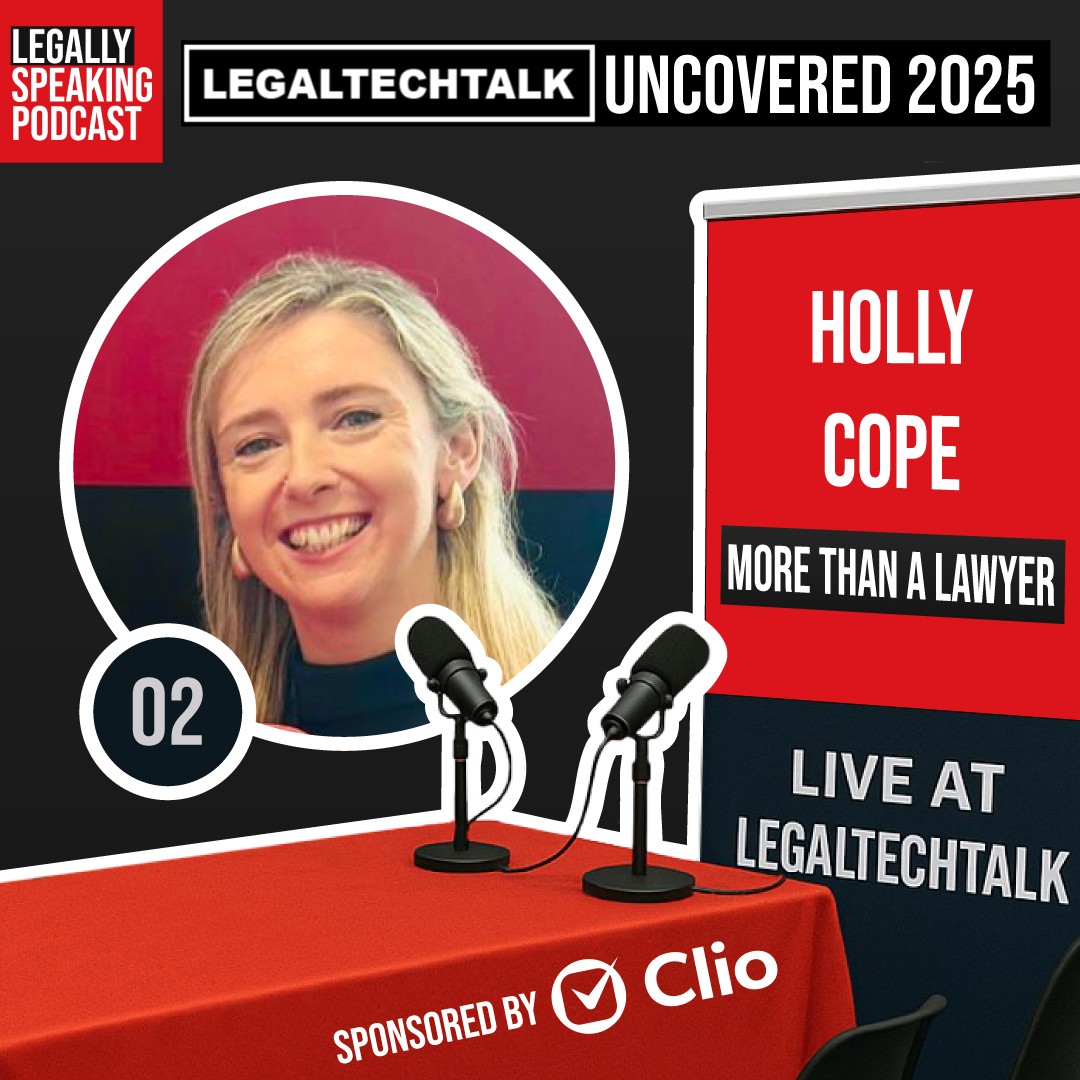
LegalTechTalk Uncovered 2025 – Holly Cope – E02
On our second episode of LegalTechTalk Uncovered 2025, we speak to Holly Cope. She is the

This week on the Legally Speaking Podcast, powered by Clio, our host Robert Hanna welcomes I. Stephanie Boyce.
Stephanie is the 177th, the sixth female, the first black office holder, the first person of colour and the second in-house solicitor in almost fifty years to become president of the Law Society of England and Wales.
Stephanie also holds a master of laws in public law and global governance from Kings College, University London. In addition to this, Stephanie has also recently been appointed to the HM Treasury and the Department for Business, Energy and Industrial Strategy as part of an independent taskforce designed to boost socio-economic diversity as senior levels in UK financial and professional services.
In this episode, she discusses the following:
Here are 3 reasons why you should listen to the full episode:
Resources:
Episode highlights:
Stephanie’s background:
What inspired Stephanie to pursue a career in the legal industry?:
History of The Law Society of England & Wales:
Stephanie’s own career:
What a typical day looks like as the President of The Law Society:
Responsibilities of The Law Society President:
Making the profession more diverse:
The biggest barriers to the legal profession:
The Solicitors Qualifying Exam (SQE):
The legacy Stephanie would like to leave as President:
5 powerful quotes from this episode:
If you wish to connect with Stephanie, you may reach out to her on LinkedIn or Twitter.
Enjoy the podcast?
Learning more about the exciting world of legal has never been this easy. If you enjoyed today’s episode of the Legally Speaking Podcast, hit subscribe and share it with your friends!
Post a review and share it! If you enjoyed tuning into this podcast, then do not hesitate to write a review. You can also share this with your family and friends so they too can learn from one of the top business podcasts.
Have any questions? You can contact me through email (rhanna@kcpartners.co.uk) or find me on LinkedIn. Thanks for listening!
Sponsored by Clio: Clio is a legal case management software that work in partnership with the Law Society of England and Wales and is an approved supplier of the Law Society of Scotland.
For more updates and episodes, visit our website and subscribe to our mailing list.
You may also tune in on Google Podcasts, Apple Podcasts, or Spotify.
Give us a follow on Twitter, Instagram, LinkedIn, and Youtube.
Finally, support us with BuyMeACoffee: https://www.buymeacoffee.com/kcpartners.
To learning more about the exciting world of law, Robert Hanna and the Legally Speaking Podcast Team.
Transcript
00:02 Rob Hanna: Welcome to the Legally Speaking Podcast. I’m your host Rob Hanna. This week I’m delighted to be joined by Stephanie Boyce. Stephanie is the 177TH, the 6TH female, The 1st black officer holder, the 1st person of color and the 2nd in house solicitor in almost 50 years to become the president of the Law Society of England and Wales. Admitted as a solicitor in 2002. Stephanie specializes in corporate governance, regulatory frameworks and professional regulation. Stephanie also holds a Master’s of Law in Public Law and Global Governance from King’s College University London. In addition to this, Stephanie has also recently been appointed to the HMN treasury and department for business, energy and industrial strategy as part of an independent task force designed to boost socio economic diversity as the senior levels in the UK financial and professional services. If all of that wasn’t impressive enough, Stephanie also made The Powerless 100 in 2021, where she was named as one of Britain’s most influential black persons. Stephanie’s mission is to leave the legal profession more diverse and inclusive than the one she entered. So, a very, very warm welcome, Stephanie.
01:20 Stephanie Boyce:
Thank you, Rob, for that introduction. I’m honored.
01:23 Rob Hanna:
So before we dive into all your amazing achievements and legal experiences today, we do have a customary question icebreaker here on the legally speaking podcast, which is on a scale of one to ten, ten being very real, how real would you rate the hit TV series Suits in terms of its reality?
01:43 Stephanie Boyce:
Well, Robert, I have to say I’ve never seen Suits, so it’d be very difficult for me to rate it. Ask me another.
01:51 Rob Hanna:
Based on that, we’ll start with a zero and we will move on. So, let’s start at the beginning. Stephanie, tell us a bit about your family background and upbringing.
02:01 Stephanie Boyce:
Well absolutely. So, my parents, my grandparents, came to the United Kingdom from the Caribbean, I say. They say in search of faith, hope in greater opportunities. My grandfather was the first to come, Henry was the first to come in 1960, followed by my grandmother in 1962, followed by my mother in 1967. So my maternal grandparents, from the island of St Vincent in the Caribbean, and my father, who is from the island of Barbados, in the Caribbean, came to England in 1964. And so, as my parents told me, they had a meeting on in Aylesbury, where I was subsequently born. And I, that’s where I grew up, you know, in a single parent household on a council estate, first of my family to go to university, my father finished formal education at the age of 12, in Barbados, because my grandmother couldn’t afford to send him on to further education at that time, because you had to pay for it. My mother did complete school. But as I say, the first to go to university. So, my grandfather, you know, my grandfather was illiterate, but his lasting legacy for us was that we were to make something of ourselves, he never told us what, but he said, we were to make something of ourselves. And I held true to that, which, to this day.
03:31 Rob Hanna:
Thank you for sharing that. And what a wonderful, wonderful wish to, to carry through. So you mentioned to make something of yourself, but what inspired you to pursue a career in the legal industry?
03:42 Stephanie Boyce:
What inspired me looking back? What inspired me, first of all, I grew up in a household, you know, where there are always, you know, grew up to the songs of Bob Marley, you know, singing about, you know, injustice is, you know, picking one social conscience, and I could see domestically and globally, you know, injustice is unfolding around the world. And, you know, and then at the age of 12, I went to live in America. And, you know, I saw America would have a lasting impression on me. And I would be overwhelmed by the poverty that existed, I would be overwhelmed by people struggling to exercise their legal rights because of their low socio-economic position, or because of the color of their skin. And I was infused that I wanted to help the voiceless to have their voice heard. And that is what absolutely inspired me and a day or so after graduating from high school in the United States. I came back to England because I wanted to study in the jurisdiction of England and Wales.
04:49 Rob Hanna:
Wonderful, wonderful. And considering the Law Society has existed for I believe, 196 years, and you’ve become the 177th , the 6th female, the first black officer holder, the first person of color, and second in house solicitor from an in house background, how does that feel? And what exactly does that mean to you?
05:15 Stephanie Boyce:
Well, not only what does it mean to me, but what it means to say, well, so many others mean the Law Society was founded in 1825. So in a couple years time, we will celebrate, as you mentioned, we will celebrate our 200 year anniversary, we received our Royal Charter in about 1845. So hence why, you know, there’s only 177 presidents and then if you make way for a couple of world wars, and so forth in between, but to have, you know, after four attempts, four attempts at trying to get elected as Deputy Vice President, and once you get elected as Deputy Vice President, it’s an automatic trajectory, that you then go on to become president, unless, of course, you know, other things get in the way. But to be in this space, and to be the first person of color, the first black office holder, to occupy this space is a remarkable achievement, and to do so, during a pandemic, you know, with so many different challenges facing the legal sector, but to be able to occupy this space, and lead my fellow colleagues, some 200,000 solicitors is an absolute privilege and joy.
06:28 Rob Hanna:
Absolutely. Stephanie, and we’re honoured to have you on the show and we say the Legally Speaking Podcast is to educate, entertain and inspired I am truly inspired by your journey. You mentioned there fourth attempt, you know, so many traits around resilience, not giving up and really, really, you know, not refusing to take no for an answer, I admire. So, with regards to your own career, what made you decide to pursue perhaps the less conventional route as a in house career?
06:58 Stephanie Boyce:
Yes, so I qualified in 2002. And I was lucky and as much that you know, the firm that I trained with was less than a ten minute walk from my home and local firm in Aylesbury called Horton and James solicitors and so qualified in 2002. But I then went on to I wanted to be a litigator, but that was at a time when conveyancing you know, there was quite a buoyant market around conveyancing public funding was starting to bite and therefore, you know, litigation wasn’t, you know, that there wasn’t a lot of work around with in terms of litigators. So, I was made redundant twice and then spent two years and then in 2004, I was I got my first in house job with the General Counsel of the bar. And so began my in house career. And now throughout my career, I’ve worked with Ofsted, The Pensions Regulator, Chartered Institute of arbitrators, the accountancy, body ACCA, and a number of others. You know, and lastly, in my own consultancy, looking at governance frameworks and transformational change,
08:12 Rob Hanna:
Wonderful. And, you know, again, what an inspiring part of your career and journey you’ve been on. And I mentioned in the introduction, your career has been particularly diverse. So what have been just some of the highlights for you?
08:28 Stephanie Boyce:
Well, I mean, obviously, you know, against all the odds, qualifying as a solicitor, you know, because of my low socio-economic background being told, I wouldn’t make it a solicitor being told I didn’t look like a solicitor r, you know, and so forth. So qualifying a solicitor as I did, and, and again, against the odds four attempts four times, to go on to be successfully elected as a Deputy Vice President and to become the president of the Law Society of England and Wales, you know, the voice of the profession. As I say, it’s a remarkable space to achieve. So those have been some of the highlights but the real highlights in doing this job doing this role is the fantastic people I get to meet in and in and outside of the law, but also being able to, you know, share our stories. Somebody said to me the other day, as we, as we got, as we climb, we lift or is it as we lift, we climb, something like that. But I think the point being around that was the fact that you know, as we’re able to progress, it’s about taking people with you on your journey, and whose life might you change, who might you inspire, just by telling your story, just by being visible.
09:48 Stephanie Boyce:
Thank you so much for sharing that Stephanie. And your story is truly inspiring, you know, four attempts and you finally made it as the president of the Law Society. Truly, truly inspirational story and a lot Our listeners will be inspired by that. But for those less familiar with the role of the President of the Law Society, tell us a little bit more about what the role entails and a day in your life.
10:09 Stephanie Boyce:
So a day in my life, what? Why don’t we start with today? Why not? So why not. So A Day in the Life starts with, this morning, I think I was up about and when I say up what it means it’s I’m awake, still in bed, but was up about five, five o’clock ish. I start to, we’re starting to go through a backlog of emails. I like to listen to a, I listened to the same podcasts every single day by a chap called Joel Osteen. And what I like about Joel is he mixes, is a bit of a televangelist. But he mixes scripture with positive thinking. And he gets me started for the day, alarm goes off at six o’clock, I’m out of bed at 6:30. And this morning, my first interview was at nine o’clock. So I did an interview earlier this morning, this is my second interview, or whatever you choose to call it, I then have a series of basis, a virtual presentation later on this afternoon. And then I will travel to Birmingham, where I will attend Birmingham Law Society’s presidential dinner. But this the role is much more than that. As I said earlier, you know, I come to this role at a time of challenge, unprecedented change, we’re in the middle of a pandemic. And so once you no restrictions are easy, what being in a pandemic has meant for some of our members is that they have had to embrace technology very quickly, almost overnight, in order to keep working in order to keep communication firms have closed, you know, one reason or the other, you know, because of low footfall because of lack of funds and so forth. Lack of investment funds, firms have closed. But also we have seen the workforce, you know, courts have been closed. So that meant that potentially firms can work. And we’ve seen the work for force work from home. So lots of challenges. But the role is also an ambassadorial role. And so not only do you advocate on behalf of your profession, with government ministers that you try and influence and lobby on points of law. The law society is politically neutral. But also, you attend lots of dinners, you speak at lots of public engagements. And so, I think by the time this week finishes I would have done for, for in person events, and an eating for dinners. Wow, wow.
12:52 Rob Hanna:
So you certainly keep busy. And it’s such meaningful, impactful work that you are doing for the legal community. And we’d love to hear more, and you’re touching on some points there about your presidential plan. Let’s first start off maybe talking a little bit more about the Access to Justice and technology. Please tell us more about your plans to improve access to justice and England and Wales, and how technology can really help this?
13:18 Stephanie Boyce:
Well, absolutely. So as as, as I alluded to, before access to justice and technology. You know, as we emerge from this crisis, it’s vital that the justice system emerges in a stronger position than before. And we’ve seen the way that technology has transformed the way transformed our lives the way we work in the last 18 months. And there are lessons that we can learn into which the new ways of working with technology should become permanent features. But, you know, of course, there is a bill currently going through Parliament, the police crime centers in Coatesville, that looks at remote observations and remote juries within the justice system. The law society is not in favor of remote juries, you know, the potential to, for juries to be in jurors to be in their own home raises and thanks up a number of concerns for us. But, you know, we have seen that technology can be useful and indeed, new and existing technology. And it’s provided a glimpse actually of how the future will look like and how technology will respond to how we provide legal advice, you know, and enable genuine access to advice. So during my time, I’m going to continue the debate on how geographical and digital barriers can be overcome with technology. But we have to be clear, it’s not a one size fits all, because we still have a massive digital skills gap in this country, swathes of the country where people don’t have the infrastructure the resource Is the skills know how capability to access technology?
15:06 Rob Hanna:
Yes. And I think you know, it’s a very important point to to highlight, and I know the work that you’re doing, and everyone involved in the Law Society are working hard to hopefully try and improve this access over time. So thank you for your continued efforts. And on the another passion, I know you are passionate about making the legal profession much more diverse. Tell us more about this?
15:29 Stephanie Boyce:
Well, absolutely. So I have said that, you know, you know, it’s my mission to leave this profession, and I’m talking about the legal profession, not just the solicitor profession, more diverse and inclusive than the one I entered. But I’m clear Rob, that it’s got to be a shared ambition, with each and every one of us playing our part. So we know that 5% of our colleagues are from an LGBT plus background, just under 17% identify as having either a physical disability, or a mental disability, you know, 17, and a half percent of our colleagues are from a black, Asian minority ethnic background, and just over 52%, of practicing colleagues, those were the practices that certificates in the system profession are female. But those numbers do are not equating to the senior parts of our profession. So whilst we have diversity at entry level, some 63% of our entrants are female, those figures, as I say, do not translate into the senior parts of their profession. And if you, if you if you couple all of that, with your background, you know, your low socio-background, then it presents even greater barriers. So, we still need to do more to challenge the stereotypes of what a sister should sound like, look like, where they should come from. And anyone with the necessary skills, knowledge and commitment to become a solicitor, in my view, should be supported, enabled and empowered throughout their career. Because we want to show people or to show that people from all walks of life, and backgrounds can make a valuable contribution in our profession, and our profession must represent the community, the society we are seeking to serve.
17:26 Rob Hanna:
And now time for a short quiz. Can you guess how many of your prospective clients now expect to work with you online? If you guessed almost four out of five, or 79%, you got it right? Once learn more about where the future of the legal profession is headed, then leading practice management software provider Clio has just released a resource I think you’re all gonna love. In that 2021 Legal Trends report, they compile data from 10s of 1000s of legal professionals to chart the major upcoming trends for law firms. The annual Legal Trends report is released every October, and you can get your copy for free at clio.com/legal trends. That’s C L I O . com forward slash legal trends. Now back to the show. Absolutely, Stephanie, and I couldn’t agree more. And really, really well said, you’ve previously spoken about how the word BAME is unhelpful. Please, could you tell our listeners more about how the term creates more challenges than perhaps opportunities?
18:35 Stephanie Boyce:
Well, absolutely, you know, if you so first of all, you would have noticed that throughout this conversation, I do not use that term. And I have pledged that you know, where it is possible that I will not use the acronym BAME. And I will spell it out in full as I have been doing when I say Black, Asian minority, I think solicitors, colleagues, or so forth. We know that there are disparities within that acronym. So for instance, if you look at the legal sector as a whole, while 17 and a half percent are from a black, Asian minority ethnic background, we know that 10% are Asian, and only 3% are black, and the remainder is of different ethnicities. You know, so we know there are disparities as to who gets ahead. And you know, only 8% of partners in the largest firms have 50 or more partners are from a black, Asian minority ethnic background, and that figure has only changed 1% since 2014. And if you broke that figure down even further, again, there would be disparities between blacks between Asians and you know, ethnic minorities even further. So, there isn’t, to my mind, a different term that has, you know, been agreed upon as yet. And I, as I say have pledged that until there is a term that we are agreed upon, I will spell it out in full rather than using the acronym where it is possible and appropriate to do so.
20:11 Rob Hanna:
And I think that just testament to your to your leadership and support your mission and what you are trying to achieve. So thank you so much for explaining that and giving us some extra context. So following on from that, what would you say are currently the biggest barriers to the legal profession?
20:28 Stephanie Boyce:
I think, you know, obviously, the biggest barriers at the moment, are in terms of trying to get into the profession, whether that’s for cost, whether that’s through networks, you know, established networks, and so forth. But of course, we have recently on the first of September this year seen the introduction of the solicitors qualifying examination. And what the SQE as it’s more widely known is set to do is it’s set to diversify, you know, open up the profession, remove those artificial barriers to entry, and diversify the profession. However, one of the issues that we have is that there has been no firm commitment from either governments or major stakeholders as to how individuals will fund the course the SQE. And that cannot be right, because we run the prospect of those who want to pursue a career in law, who were not financially abled, being financially excluded. And of course, we want to counter that ensure that everyone has the ability, who wants to study law has the ability to join this profession, and stay in this profession. But we also know Rob, that you know where you come from. So I’ve long said that law should be taught in schools, from an access to justice point of view, and from a social mobility point of view. And if I pick up on the social mobility point of view to start with, if we start to teach law in schools, from a younger age, it starts to demystify some of those myths around, it’s an elitist profession. It’s not a profession that looks like me, sounds like me, it’s not a profession where I belong. But if we start to teach law in schools, it from a young age, individuals start to think about the stepping stones, the roadmap, what they have to do as they navigate their way through the educational system as to what they have to do to have a career in law. You know, what, even down to what university they should go to, because we know that, you know, lawyers like to recruit from Russell Group universities, but we also know that from those networks, comes work experience comes sponsors, mentors, and for most of us, lots of us, including myself, I didn’t have access to those networks. I didn’t know a solicitor, that I could ask a question, you know, or can I have asked, Can I have work experience until I was second year at university? So it’s important that as a career, as a profession, we highlight an advocate to get law added to the national curriculum.
23:10 Rob Hanna
Yes really, well said, Stephanie. And I absolutely support what you are you are suggesting, and let’s hope that does happen over time. Now, I know we could talk about the SQE for a whole podcast episode in itself. So do you feel the SQE we will improve the legal profession by improving access?
23:30 Stephanie Boyce:
Well, as I say, that is the hope that is the desire. It’s certainly obviously it’s too early to tell because as I say, it only launched on the first of September. But if there is no commitment from government from major stakeholders to fund the SQE, then as I say, we run the potential of financially of and of those who want to pursue a career in law, who do not have the resources to do so being financially excluded. And that cannot be right now, the solicitors Regulation Authority, the SRA, has committed to monitor to monitoring the SQE, and to monitor it over the next coming years. And we will hold the SRA to that. And if it’s not working, if we know that there are bottlenecks, then we will work with the SRA to ensure that as I say that those individuals who want to pursue a career in law are not financially excluded.
24:32 Rob Hanna:
Yes, yes. Let’s let’s hope and I love that you are talking around collaboration there and working with the SRA to achieve the overarching goal of greater access to the profession. Do you agree that we should encourage aspiring and current practicing lawyers to be more human and allow them to embrace their creativity on top of their academic prowess, particularly off the back of the pandemic?
24:57 Stephanie Boyce:
Not quite sure what you mean Rob. By more human. What do you mean by that?
25:05 Rob Hanna:
I think, you know, we’re seeing now that a lot of lawyers are opening up and you know, showing a little bit more about their, you know, their authentic selves, perhaps on on online and on social media, and perhaps being a little bit more relatable than perhaps the legal industry was previously Do you? Do you think that is a positive for the industry, and there’s a real wave of creativity in terms of aspiring lawyers coming in with lots of ideas, which potentially could be good for business development, for firms and client attraction over over time.
25:42 Stephanie Boyce:
I think that goes back to, you know, what I was saying before, about, you know, we’ve just been through some of the toughest times, we’re still going through some of the toughest times, and I think, you know, a period of reflection, we’ve all taken the time to reflect this pandemic has, nobody has escaped, you know, this pandemic, we’ve all been touched by it in some way. And as I say, I think that’s given us the opportunity to reflect, you know, when others tell their story, I’ve often been asked, why do you tell your story, you know, you know, coming from a single parent, household, and so forth. And I say, Well, why not? I’m not embarrassed about my story about my background, this is my badge, this is who I am. And when you tell your story, somehow empowers others to tell their story. And by telling our story, we enable others to rise. And that’s absolutely what it’s about. So, you know, it’s about bringing your true authentic self to work, and feeling empowered enough to do so.
26:48 Rob Hanna:
Here, here. Really well said, Stephanie, and I couldn’t agree more, and how can people in the legal industry help you with your mission?
26:57 Stephanie Boyce:
Well, as I say, you know, when I said about my mission, to leave this profession, and we each have a role to play, we must all take a look at, you know, the culture of the organizations we work in, we must look at, you know, whether or not there is, you know, work allocation, whether or not the, you know, the distribution of work is fairly being distributed, how we recruit, where we recruit, the language that we place in our adverts on our website, you know, people if people can see it, they can aspire to be it. And, and, you know, there is having done research there, all sides, you haven’t done research, we know that if you come from a Black Asian Minority Ethnic background, you will leave the profession unlikely to leave the profession earlier, or to go in house, as I did in 2004. Because potentially, we feel that, you know, as I did, that, I would have a greater opportunity in respect of career progression, more flexibility. And, you know, so we need to look at the whole holistic picture, and what more we can all do. So if we don’t have some of those things in our current organizations and our current businesses, then it’s right that we asked, Why are we not doing this. And then we look rather than looking in the same place the same old place for talent, as much of the same old same old that we start to look in different places, because talent can be found in everywhere, everywhere. And we know that there is a moral and business imperative for diversity and inclusion. But, but it is not just enough to have a tick box exercise of diversity. You know, we’ve made it because we are diverse, we must truly be inclusive, because you cannot have diversity without inclusion.
28:56 Rob Hanna:
Yes, yes, absolutely. Stephanie, and thank you so much for for sharing that and the legally speaking podcast and all of us involved, support your mission, and we’ll do our best with that when partnering with you to help, you know, get this message spread as far as wide as possible. On the last sort of before we wrap up, Stephanie, how do you wish to be remembered following your your time as the the Law Society president?
29:20 Stephanie Boyce:
I would like to be remembered as somebody who made a difference. You know, I’ve given the call to action, but somebody who made a difference? You know, I used to say before I became president, I used to say that if I change one person’s life, if I inspired one person, I would go quietly, you know, but as I say, this is a remarkable position to be in. And thanks to you know, yourselves at legally speaking podcast, to share this message far and wide as you’ve suggested, because it goes back to it’s about helping others to find that Through authentic self, to have their voice heard. And to realize that this world is a beautiful place that we all can be in sharing existing.
30:12 Rob Hanna:
I’m more I’m what a lovely message and way to wrap up the show, Stephanie, it’s been an absolute pleasure having you if people want to follow or get in touch with you about anything we have discussed today, what’s the best way for them to do that? Feel free to shout out any relevant web links or social medias and we will also ensure we share these with this episode for you.
30:36 Stephanie Boyce:
Absolutely. But of course, the Law Society has its website law society.org.uk, where you can find lots of important information and more about the work we do. And if you wish to get in touch with me directly. You can connect with me on LinkedIn. Or you can follow me on Twitter. And I believe it’s i dot Stephanie voice or I Stephanie voice one on Twitter. But either way, if you if you Google me or find me.
31:06 Rob Hanna:
Yes, they will most definitely. Well, thank you so much. Once again, Stephanie. It’s been a real pleasure having you on the show. On behalf of all of us at Legally Speaking Podcast, we wish you lots of continued success with your legal career and mission for the Law Society, but from all of us and for now, over and out. This week’s review comes from Rose Carriere, Rose says so entertaining and insightful. This podcast is an absolute delight to listen to. And it’s so educating Rob makes it easy to listen to, which is of an essence for someone like me, who tends to space off when there’s too much information at once and not enough interaction. I’ve also been able to apply the advice he provides here within my daily life not only as a law student and legal intern, but also as an aspiring solicitor not to mention within my role as head of social media for a small boutique law firm I’m working for. Thank you so so much, Rob, and keep up all the hard work. Thank you so much rose for your lovely kind review. We really appreciate it from all of us on the Legally Speaking Podcast. If you would like a shout out on the show, all you have to do is leave us a rating and review and we’ll ensure we shout you out at some point during season 5.
You may also tune in on Goodpods, Apple Podcasts, Spotify, or wherever you get your podcasts!
Give us a follow on X, Instagram, LinkedIn, TikTok and Youtube.
Finally, support us with BuyMeACoffee.
🎙 Don’t forget to join our Legally Speaking Club Community where we connect with like-minded people, share resources, and continue the conversation from this episode.
Sponsored by Clio – the #1 legal software for clients, cases, billing and more!
💻 www.legallyspeakingpodcast.com
📧 info@legallyspeakingpodcast.com
Disclaimer: All episodes are recorded at certain moments in time and reflect those moments only.

On our second episode of LegalTechTalk Uncovered 2025, we speak to Holly Cope. She is the
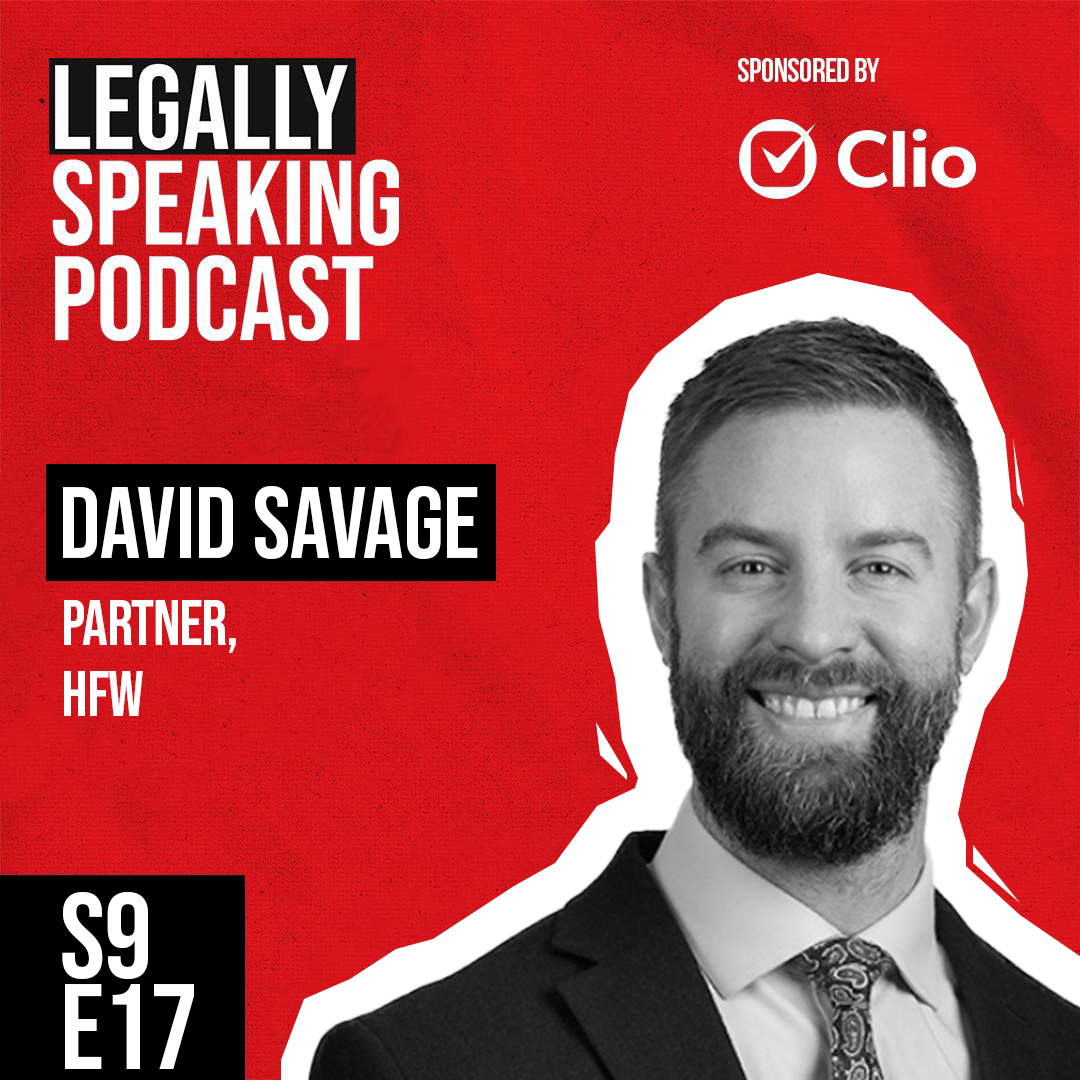
Fraud, corruption, money laundering, how do the world’s top lawyers tackle financial crime at the highest
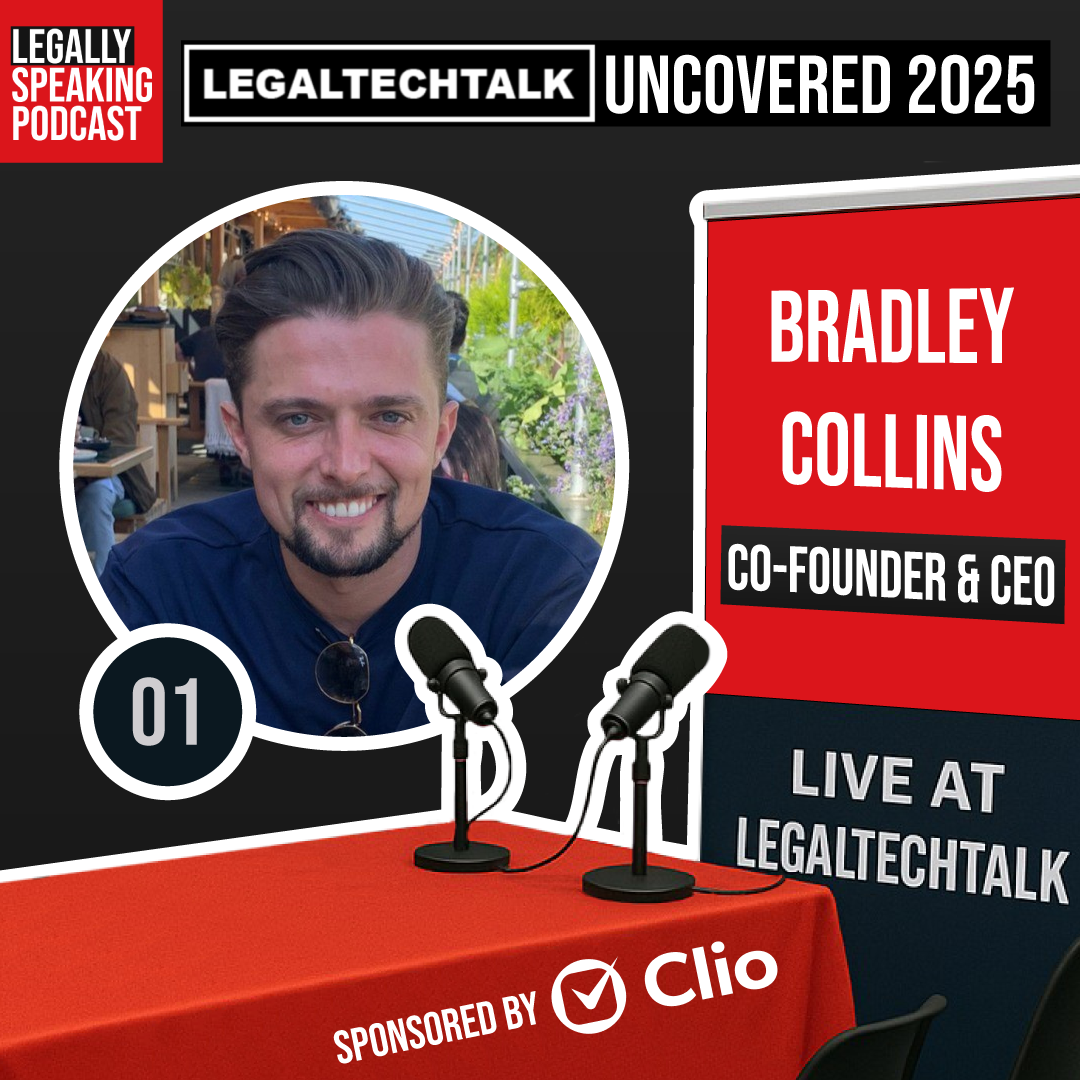
🚨 BREAKING NEWS: CEO of LegalTechTalk Shares What You Can’t Miss at #LTT25 🚨 🎤 This
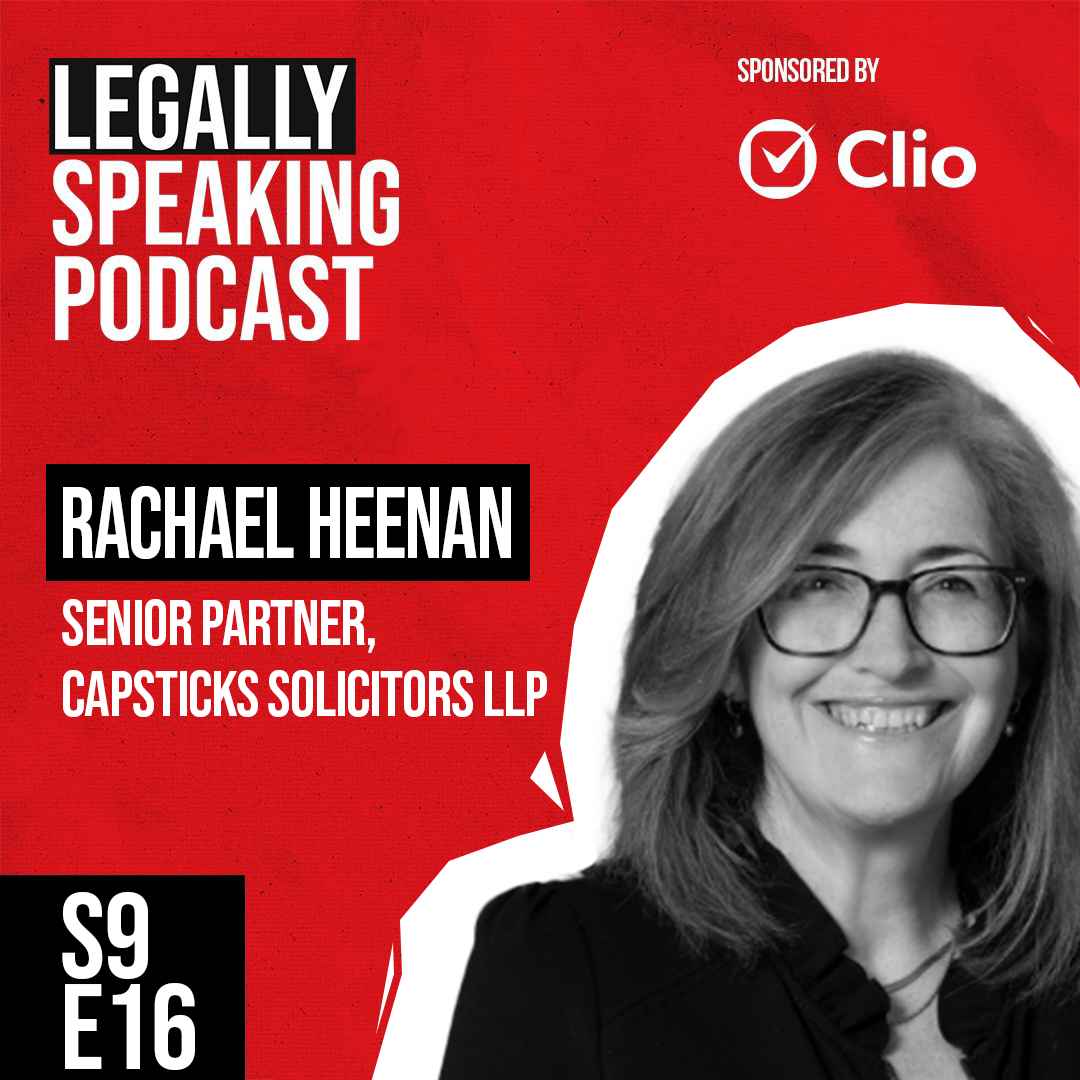
On today’s Legally Speaking Podcast, I am delighted to be joined by Rachael Heenan. Rachael is
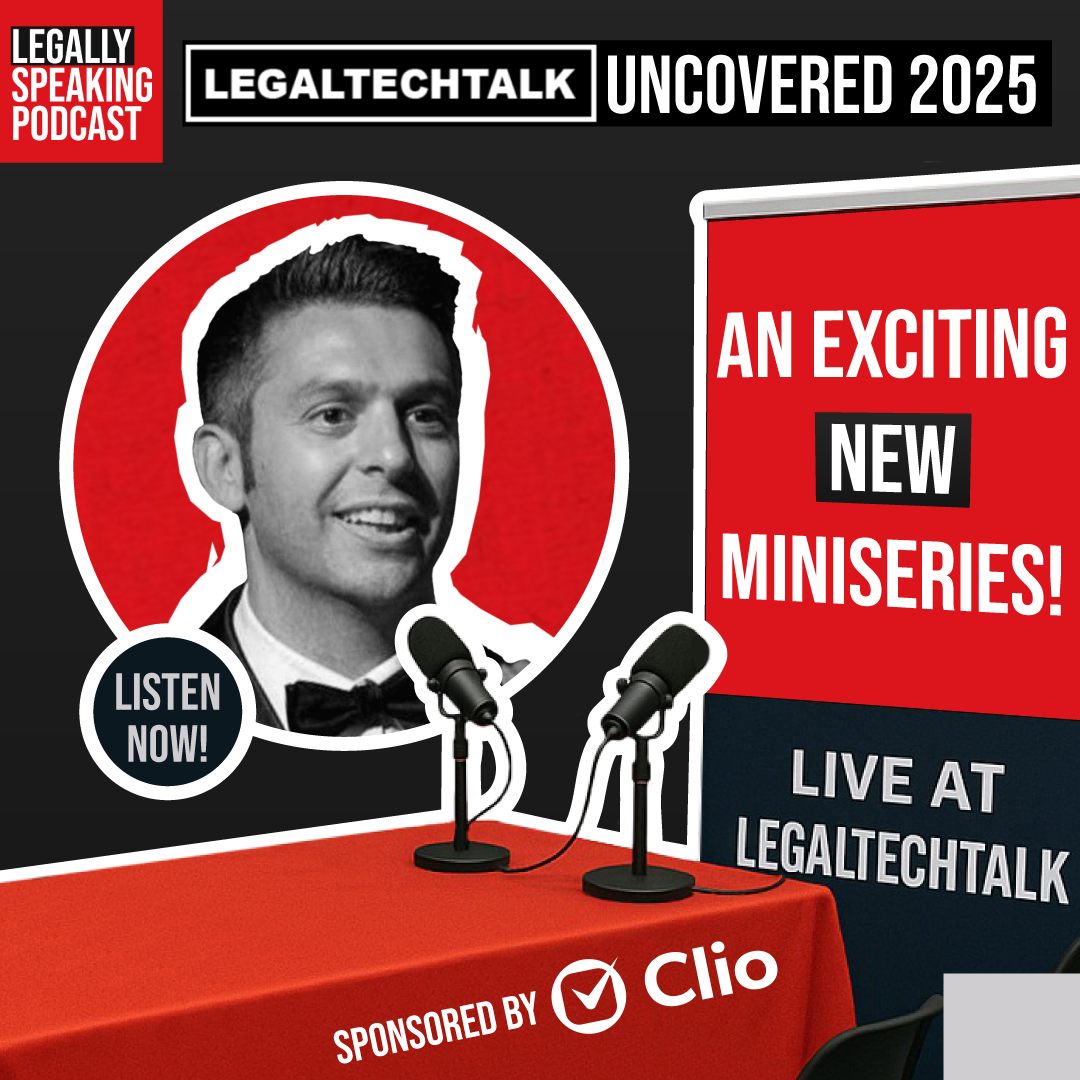
We’re bringing the heat to LegalTechTalk 2025 🔥 The Legally Speaking Podcast ™️ — proud returning
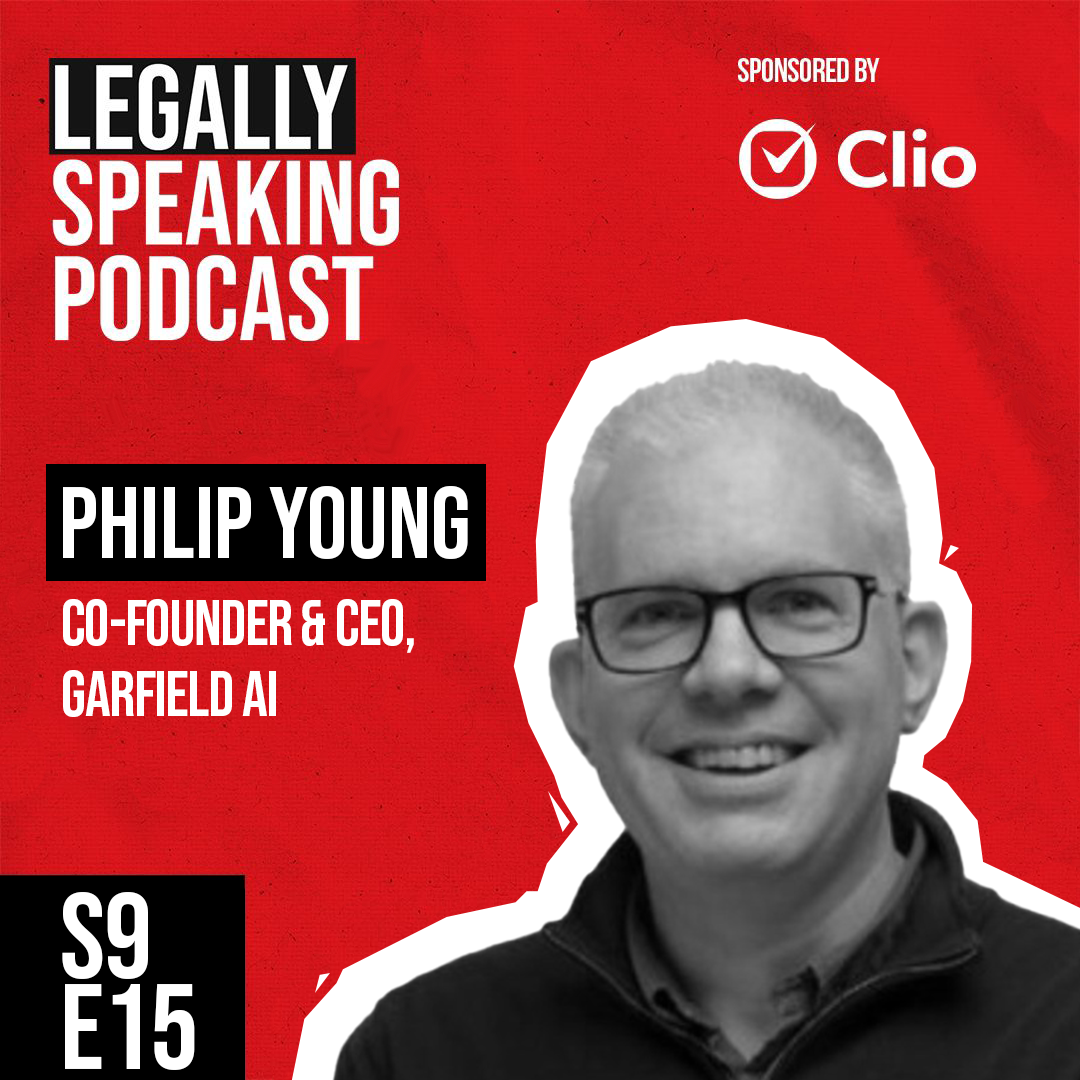
On today’s Legally Speaking Podcast, I’m delighted to be joined by Philip Young. Philip is the

*DISCLAIMER* All episodes are recorded at certain moments in time and reflect those moments only. The podcast does not support or associate itself with any inappropriate behaviour or actions that may have occurred after recording.